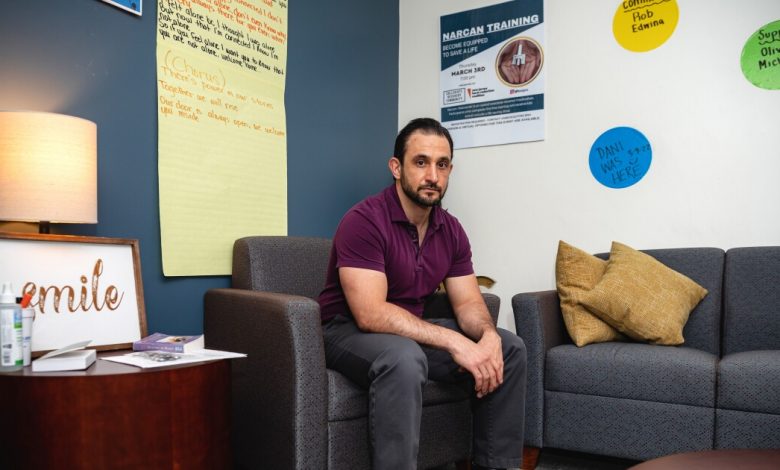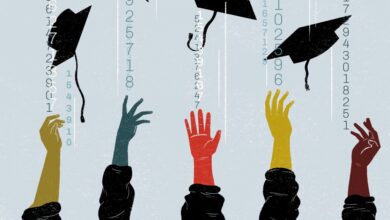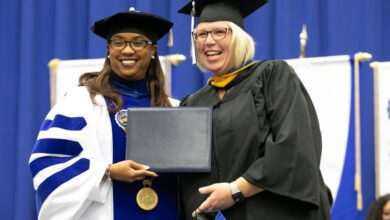Addiction-Recovery Programs Work to Reach the Students Who Need Them Most

In 2006, Eric Van Eck was a freshman nursing student at the College of New Jersey, the world at his fingertips. He had a steady relationship with his high-school girlfriend and a supportive family back home in Rockaway Township, N.J.
Things began to fall apart the summer before senior year, when his girlfriend’s brother, whom he was close to, died, and the pair broke up. Van Eck was devastated. By that point, the upsetting situations Van Eck had witnessed during his clinical rotations had taken a toll on his emotions, too. He decided instead to pursue engineering, which required him to start college all over again. To cope with the stress, he tried new substances, including prescription pain medication, in addition to the marijuana and alcohol he’d consumed since his teens.
In the fall, Van Eck returned to the college, known as TCNJ, as a freshman again, this time with a “full-blown substance-use disorder.” He joined a fraternity, where alcohol flowed freely. Once a stellar student, he now felt that “nothing else mattered but getting high.” His grades fell by the wayside.
In 2012, three years after starting over, he was dismissed from TCNJ for poor academic performance.
“At that point, I continued to run my life into the ground,” Van Eck says.
In 2016, Van Eck was admitted to a treatment facility, which helped him recover from his substance-use disorder. He applied to TCNJ to finish what he had started a decade earlier. Rejected. He applied again. Rejected. He applied “again and again and again,” he says, until eventually TCNJ readmitted him, in 2017.
By then, TCNJ had begun a program to help students like Van Eck stay sober: a collegiate recovery community, started with state grant funding in 2015. There he befriended other students in recovery, received therapy from a certified drug-and-alcohol counselor, and lived in a substance-free residence hall — an about-face from when he spent entire days drinking in his fraternity house.
In 2018 — 12 years after he had first started college — he graduated with a degree in public health.
The recovery program “was an absolute life-changer for me,” Van Eck says. “I had a lot of shame, a lot of guilt, a lot of feelings of being different-than … It helped me find my voice.”
Students in recovery are actively looking for activities that don’t revolve around alcohol. They’ve been there, done that, and it didn’t work out for them.
Collegiate recovery programs have grown considerably since a Brown University professor founded a “dean for chemical dependency” position at his college in 1977. The Association of Recovery in Higher Education, which represents collegiate recovery programs, now has 156 member institutions nationwide, and more such programs exist outside its purview, although it’s unclear how many institutions offer them.
Research indicates the programs can have promising results. A 2018 survey found that nearly 90 percent of alumni of such programs had not relapsed after graduation, and data from Texas Tech University showed that its recovery-program participants had, on average, higher GPAs and graduation rates.
But collegiate recovery programs remain small and relatively unknown, often wrapped up with the student-conduct system. Experts say there should be more “touch points” so students with substance-use problems don’t fall between the cracks, and those seeking substance-free fellowship on campus can find it.
By the Numbers
Despite what pop culture might lead one to believe, not all college students use drugs and drink heavily.
Many don’t drink at all, or rarely do. In the American College Health Association’s most recent National College Health Assessment — a survey of more than 33,000 students at 41 colleges administered last fall — nearly a quarter of respondents indicated they had never consumed alcohol. Only a little more than half of respondents said they had drunk alcohol in the past two weeks, with 27.5 percent binge-drinking, or consuming five or more alcoholic beverages, in the same period.
Christopher Freeman, the founder of the College of New Jersey’s recovery program and its assistant director of alcohol- and drug-support services, says he thinks the campus myth that everyone is drinking may drive excessive consumption.
Collegiate recovery programs, he says, create space for students who seek alternatives to campus drinking and drug culture. The programs can include students in recovery as well as “allies of recovery,” who may have been affected by a family member’s addiction or a friend’s.
“Students in recovery are actively looking for activities that don’t revolve around alcohol,” Freeman says. “They’ve been there, done that, and it didn’t work out for them.”
According to the American College Health Association’s survey, 1.6 percent of students indicated they were in recovery from substance abuse, and 1.1 percent of students reported having been diagnosed with an alcohol or drug addiction.
Jim Lange, executive director of the Higher Education Center for Alcohol and Drug Misuse Prevention and Recovery, located at Ohio State University, says there are students in recovery from substance abuse on every campus, though they may not be known to administrators.
In addition to students who struggle with substance abuse, the programs offer support to students whose loved ones face problems with addiction.
“The reach,” Freeman says, “is well beyond what is sometimes perceived as a small group of students.”
Creating Connections
For students to seek help through collegiate recovery programs, they need to know they exist.
One of the main ways students find out about them, experts say, is through their college’s conduct system, which may refer students who get in trouble for drinking or using drugs to the programs.
But, Lange says, the students who get in trouble tend already to be in “high contact” with the university — dorm residents, fraternity and sorority members, athletes.
“If they’re not in any of those groups, the campus probably has far fewer touch points to identify a student,” Lange says. “They won’t get in trouble with the university because they’re doing whatever behaviors that would get them in trouble usually off campus.”

Aaron Wilson Watson, The College of New Jersey
Those students can fall between the cracks. As a way of finding them, Lange suggests screening the general student body, which can help identify older students, graduate students, nonresidential students, and students not involved in Greek life. One way colleges can do that, Lange says, is to screen everyone who comes through the health center.
And while conduct systems can indeed be critical in connecting students with the help they need, the discipline process can also jeopardize their ability to stay enrolled.
“We identify students based on getting in trouble,” Lange says. “But the getting in trouble is putting them at risk of successfully staying within the university at the same time they’re trying to potentially make changes to their substance use.”
Kristina Canfield, interim executive director of the Association of Recovery in Higher Education, says students shouldn’t be referred to collegiate recovery programs as punishments but rather for support.
At TCNJ — a public university with an enrollment of about 7,800 — students find out about the recovery program through several avenues, including through the student-conduct system and through their deans. The program’s staff also runs a table at activity fairs and orientation, and maintains an active social-media presence.
There’s also the recreation department’s RECreate Your Night, which offers substance-free programming, including scavenger hunts, gaming tournaments, and basketball, four nights a week, funded by a state grant.
Freeman, the assistant director of alcohol- and drug-support services at TCNJ, says it is important to have plenty of opportunities for substance-free connection because a single message is not likely to reach everybody who might need it.
We identify students based on getting in trouble. But the getting in trouble is putting them at risk of successfully staying within the university.
“If I send out an email to the entire population, how many people actually read it?” he says. “If I put out messages on social media, how many people are actually following an individual account? If I put up a sign on campus to promote an activity, how many people actually do that, right?”
Robert Mitten, a junior at TCNJ and vice president of its collegiate recovery community, found out about the program after contacting an official in the college’s alcohol- and drug-education program, who set him up with Freeman.
“I didn’t think about it for a while,” Mitten says, “but then once I really needed it, I was like, ‘Oh, wait, this is an option.’”
Mitten now leads many of the recovery meetings. He says about six to eight people come each week.
Faculty members, too, can be important touch points for college recovery programs, according to Canfield, because they interact with students so much.
“They are going to most likely be the first folks on campus who recognize that a student may be in trouble, that a student may need help,” she says.
Recovery Is Possible
Van Eck says that during his first stint in college, he’s not sure he would have been ready to engage in a recovery program. His “denial was still pretty deep” at that point, he says.
Still, had it been available, Van Eck says, “I think it would have been beneficial to have had some interaction, and that seed to be planted. But it wasn’t. So this was completely new to me.”
After graduating from TCNJ, Van Eck went to work in recovery support for a nonprofit in northern New Jersey. Until he found out the position to oversee TCNJ’s collegiate recovery community was open.
In January he started as a recovery and prevention coordinator at TCNJ, mentoring students who struggle with the same issues he faced when he was in college. His position is also funded by a state grant, he says.
“We’re able to learn from each other, and I’m able to dispense some of my experience,” Van Eck says. “My job is to advise these beautiful human beings. They all have something so great to offer this campus.”
Van Eck hopes to serve as proof that recovery is possible, even when alcohol and drugs abound on campus.
“Faculty, staff, institutional people, but also the majority of the student population, are not going to knock you down for choosing not to use substances,” he says. “Most people, the reaction … was, ‘Oh, wow, that’s really cool. I’m glad that you made that decision for yourself and that you’re doing better.’”
Source link






